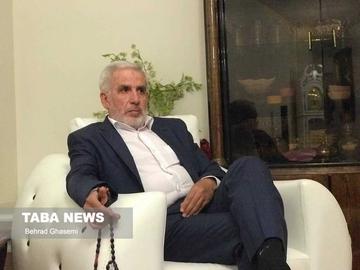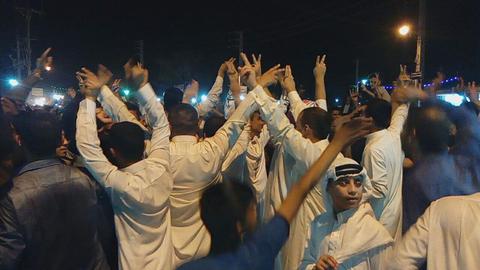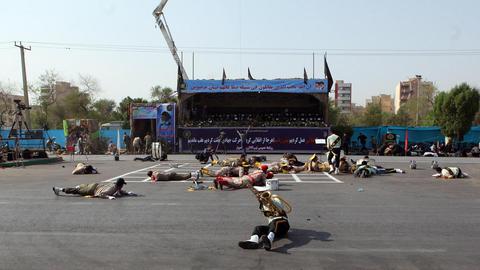When it took credit for the attack on a military parade in Ahvaz, the capital of the southwestern province of Khuzestan, the secessionist group Al-Ahwaz Arab Liberation Movement made a name for itself. The attack on September 22 left at least 25 dead and 53 wounded.
But the Al-Ahwaz Arab Liberation Movement is not alone. There are other groups in Khuzestan that oppose, and in some cases are openly hostile, to the Islamic Republic.
Below we provide snapshots of these groups, where and how active they are, what they are fighting for and their political and ideological views. IranWire’s main source is the Iran-based Habilian Association, which advertises itself as a “Human Rights NGO established with an aim of elucidating the fact that Iran is one of the biggest victims of terrorism. It was founded in 2005 ‘by a group of families of Iranian terror victims.’” The Secretary General of Habilian Association is Mohammad Javad Hasheminejad, the son of Ayatollah Abdolkarim Hasheminejad, who was assassinated in October 1981 by the People’s Mojahedin Organization (MEK).
1. Al-Ahwaz Arab Liberation Movement
The Al-Ahwaz Arab Liberation Movement (جنبش عربی آزادیبخش الاحواز) is the best-known and the most violent Arab group in Khuzestan [Persian link]. It was founded by Habib Nabgan, who lives in Denmark, after he moved there as a refugee from Iran. The group operates from Denmark, Sweden and the Netherlands and aims to overthrow the Islamic Republic through armed uprising.
Members of the group have access to heavy arms and explosives and in 2005, it carried out 13 bomb attacks in Khuzestan. It operates a military wing called the Brigades of the Martyrs Al-Nasser Mohiuddin, which was founded in 1997 with the aim of turning Khuzestan into an independent Arab state.
Since then, Al-Ahwaz has carried out a series of attacks in Khuzestan, including the bombings of the Ahvaz governor’s offices, the Department of Planning and Budget, the Housing and Urban Development Organization, the Khuzestan Sugar Cane Development Company, Oil Well No. 179 and associated pipes, Abadan oil pipes, the Khuzestan Natural Resources Authority, Saman Bank in the affluent Ahvaz neighborhood of Kianpars, and the governor’s offices in Abadan and Dezful.
2. Islamic Reconciliation Party
The Islamic Reconciliation Party (حزب لجنهالوفاق), also known as the Reconciliation Committee, was the only Arab ethnic political group that the Islamic Republic tolerated for a period of time, though this tolerance did not last long [Persian link]. Jasem Shadidzadeh Al-Tamimi, the party’s secretary general, served as a representative for Khuzestan from 2000 to 2004 as a member of Islamic Participation Front, a reformist coalition that was banned in 2010 in the aftermath of the disputed 2009 presidential election.
The party was founded in 1999 and its stated aims were to promote the cultural, political and social rights of the Arab minority, ending discrimination against them and ensuring Arabs were elected to local councils and the parliament. In 2003, it succeeded in winning the majority of seats in Ahvaz City Council.
In 2005, however, the Arab minority of Ahvaz and other parts of Khuzestan rioted, leading to at least 20 deaths and hundreds of arrests. The riots were apparently triggered by a letter signed by Vice President Mohammad Ali Abtahi that called for the forcible relocation of the local Arab population, and for the minority to be replaced with Persians. Abtahi dismissed the letter as a forgery.
Following the riots, Al-Tamimi wrote a letter to the then President Khatami, calling on him to remove the "wall of mistrust between the proud Iranian ethnicities, so that the infected wounds of the Arab people of Ahwaz may heal." He added: "Our wishful thinking about reforms in Arab affairs by the reformists has been only a mirage", indicating that he no longer had faith in the Participation Front. He listed a number of grievances, including violence against Arab demonstrators by security forces, land confiscation, the destruction of Arab residential compounds, racial discrimination and the official view that Arabs posed a security threat.
In November 2006, the Revolutionary Court in Ahvaz banned the Islamic Reconciliation Party for being a "subversive organization trying to overthrow the regime by spreading racial hatred and provoking ethnic clashes." The court also warned that anybody cooperating with the party would be forcefully prosecuted.
Arab secessionists want an independent state called “Ahwaz” that includes all Iranian provinces on the Persian Gulf (or the “Arabian Gulf” as they call it). This map appears on many of their sites
3. Al-Arabistan Group
The Al-Arabistan Group (گروه العربستان) is based in the Netherlands and its leader is Adel Sowidy [Persian link]. The secessionist group claims to be non-violent and democratic, but Iranian authorities accuse it of being an armed group that “incites people to riot” and works to discredit the Islamic Republic at international bodies.
4. Arab Front for the Liberation of Al-Ahwaz (AFLA)
The Arab Front for the Liberation of Al-Ahwaz (جبهه العربیه لتحریر الاهواز) is a secessionist group led by Mahmoud Hossein Mashavi and its members are active in Europe, Iraq and Iran [Persian link]. This secessionist group was founded on April 20,1980 in Iraq with the support of the Iraqi Intelligence Services, six months before Saddam Hussein’s invasion of Iran.
The group is reportedly armed and has access to heavy explosives. “The Front has been resisting the Iranian occupation of the Ahwazi land and combats political, cultural and economic backwardness that was imposed on Ahwaz people because of the occupation of their land,” its website declares. “AFLA seeks to restore legally and legitimately the rights of the Ahwaz Arabs, which have been usurped by Iran since 1925. The Ahwaz [people] have the right to self-defense in accordance with the stipulated international laws and resolutions.”
The group was responsible for a series of bombings in Iran’s oil-producing areas, including Khuzestan.
5. Democratic Solidarity Party of Al-Ahwaz (DSPA)
The Democratic Solidarity Party of Al-Ahwaz (حزب تضامن الاهوازی) was founded in 2003 in London by Mansour Silawi Ahwazi [Persian link]. The group officially rejects violence and separatism and advocates a “federal system” for Iran and “internal self-determination” for Khuzestan and other parts of the country. To achieve this goal, it has formed a coalition with like-minded parties representing Kurds, Azeris, Baluchis, Turkmen and Lors. Formed in London in March 2005, the Congress of Nationalities for a Federal Iran (CNFI) brought together DSPA, the Baluchistan United Front, the Federal Democratic Movement of Azerbaijan, the Democratic Party of Iranian Kurdistan, the Baluchistan People's Party, the Organization for Defense of the Rights of Turkmen People, and Komalah, a militant Kurdish opposition party.
The Islamic Republic, however, considers the Democratic Solidarity Party of Al-Ahwaz to be a secessionist group and accuses it of inciting riots and creating unrest.
6. Party of Arab Movement for the Liberation of Al-Ahwaz
The Party of Arab Movement for the Liberation of Al-Ahwaz (حزب النهضه العربی لتحریر الاهواز) is based in Canada and is led by Sabah Al-Musawi [Persian link]. The group was established in August 2002 as a "revolutionary ideological organization that believes in the correlation between Arabism and Islam and aims to expel the Persian usurper and establish a free Arab society in Al-Ahwaz."
The group has been accused of playing a role in the 2005 unrest in Khuzestan.
7. Al-Ahwaz Liberation Organization
The Al-Ahvaz Liberation Organization (المنظمه العربیه لتحریر الاهواز) is led by Faleh Abdullah Al-Mansouri, who fled to the Netherlands in 1988 after he was sentenced to death [Persian link]. On 11 May, 2006, Al-Mansouri was arrested while he was in the Syrian capital of Damascus, and extradited to Iran for traveling on an "illegal" Iranian passport, a claim made by the Syrian government. In 2007 al-Mansouri was sentenced to death in Iran for a second time. Following a campaign by Amnesty International, he was released in 2014 after spending close to eight years in prison. He then returned to the Netherlands.
The Al-Ahwaz Liberation Organization is a secessionist group and in recent years has taken credit for all armed actions in Iran against the Islamic Republic.
8. Al-Ahwaz Arab Peoples Democratic Popular Front (AADPF)
Al-Ahwaz Arab Peoples Democratic Popular (الجبهه الدیمقراطیه الشعبیه للشعب العربی الاحوازی) is a separatist group based in Canada and was founded by Ali Mazra’a [Persian link]. It claims to be “democratic” and against terrorism, but it has taken credit for violent activity, including an attack on a police station in 2011 that left six policemen dead, as well as other armed clashes in the same year and the bombing of an Abadan refinery.
9. Al-Ahwaz National Liberation Organization (ANLO)
Al-Ahwaz National Liberation Organization (المنظمة الوطنية لتحرير الأحواز: حزم), was founded in 2010 on the birthday of Gamal Abdel Nasser, the pan-Arabist president of Egypt from 1956 to 1970 [Persian link]. The organization’s founders were Adel Sowidy, leader of the Al-Arabistan Group based in the Netherlands, and Habib Nabgan, leader of the Al-Ahwaz Arab Liberation Movement based in Denmark. ANLO is a coalition of their two groups and other small groups of secessionist Arabs. It supports armed struggle against “Persian occupiers,” and it is active in political and cultural arenas as well.
10. National Liberation Movement of Ahwaz (NLMA)
The National Liberation Movement of Ahwaz (حرکه التحرير الوطنی الاهواز) was founded in 1997 by Taher Al-Seyed Na'ma and Khaz'al Al-Hashemi. It is based in Canada but has activists in Europe and Syria as well. The group’s primary goals include independence of “Ahwaz” through armed struggle against the Islamic Republic.
visit the accountability section
In this section of Iran Wire, you can contact the officials and launch your campaign for various problems



























comments